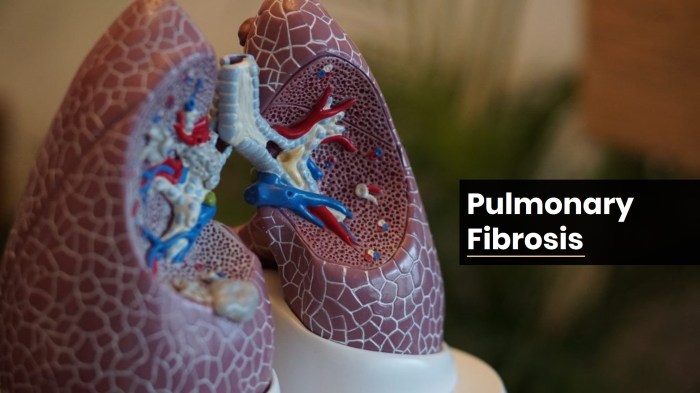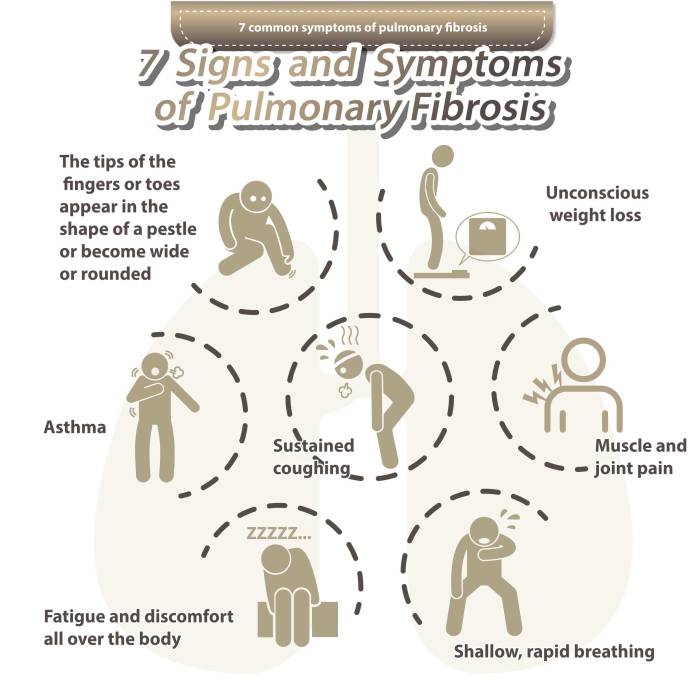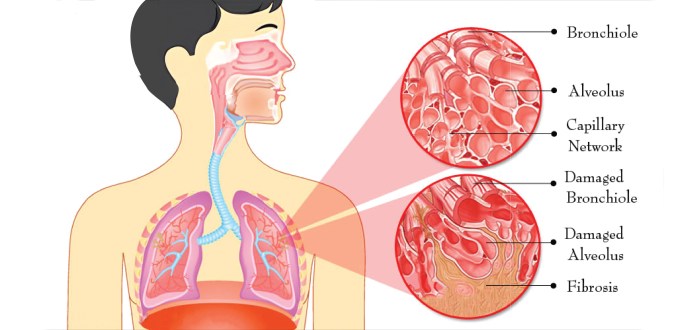Symptoms of lung fibrosis – Delving into the realm of lung fibrosis, we uncover a myriad of symptoms that can significantly impact an individual’s well-being. From the debilitating shortness of breath to the persistent cough, each symptom serves as a manifestation of the underlying damage to the lungs, highlighting the importance of early detection and management.
This comprehensive guide delves into the spectrum of symptoms associated with lung fibrosis, providing a deeper understanding of their causes, impact, and potential complications. Empowering individuals with knowledge, we aim to facilitate timely diagnosis, appropriate treatment, and improved quality of life for those affected by this condition.
Shortness of Breath

Shortness of breath is a common symptom of lung fibrosis. It occurs when the lungs are unable to take in enough oxygen or get rid of enough carbon dioxide. This can cause a feeling of breathlessness, even after minimal exertion or at rest.
Progression of Shortness of Breath, Symptoms of lung fibrosis
The severity of shortness of breath can vary depending on the stage of lung fibrosis. In the early stages, it may only be noticeable during exercise or strenuous activity. As the disease progresses, shortness of breath can become more severe and occur even during everyday activities, such as walking or talking.
Impact on Daily Activities and Quality of Life
Shortness of breath can significantly impact a person’s daily life and quality of life. It can make it difficult to perform everyday tasks, such as climbing stairs, carrying groceries, or playing with children. It can also lead to fatigue, anxiety, and depression.
Fatigue and Weakness
Individuals with lung fibrosis often experience excessive fatigue and weakness, which can significantly impact their daily lives. This fatigue arises from several physiological mechanisms, including:
- Reduced Oxygenation:Lung fibrosis damages the lungs, making it difficult for them to absorb oxygen. This oxygen deficiency can lead to fatigue and weakness.
- Increased Energy Expenditure:Breathing becomes more difficult for individuals with lung fibrosis, requiring more energy to inhale and exhale. This increased energy expenditure contributes to fatigue.
- Inflammation:The inflammation associated with lung fibrosis releases cytokines, which can cause fatigue and muscle weakness.
Managing Fatigue
Managing fatigue is crucial for individuals with lung fibrosis. Strategies include:
- Pacing Activities:Breaking down tasks into smaller, manageable chunks can help prevent overexertion and conserve energy.
- Prioritizing Rest:Regular breaks and naps can help restore energy levels.
- Exercise:While it may seem counterintuitive, regular exercise can strengthen respiratory muscles and improve energy levels.
- Medications:In some cases, medications such as stimulants or oxygen therapy may be prescribed to alleviate fatigue.
- Lifestyle Changes:Quitting smoking, eating a healthy diet, and getting enough sleep can contribute to improved energy levels.
Crackling Sounds in Lungs
Lung fibrosis can cause crackling or popping sounds in the lungs, known as rales. These sounds are produced when air passes through narrowed or inflamed airways, causing vibrations in the lung tissue.
Structural Changes in the Lungs
In lung fibrosis, the lung tissue becomes thickened and scarred, which narrows the airways. This narrowing creates turbulence as air flows through the lungs, leading to the production of rales.
Significance of Rales
Rales are an important diagnostic sign of lung fibrosis. The presence of rales, especially in the lower lobes of the lungs, can indicate the presence of fibrosis. Monitoring changes in the intensity or location of rales over time can also help assess the progression or response to treatment of lung fibrosis.
Chest Pain

Chest pain is a common symptom of lung fibrosis. It can range from mild to severe and may be described as a dull ache, sharp pain, or tightness in the chest. The pain is often worse with coughing or deep breathing and may be accompanied by shortness of breath.The chest pain in lung fibrosis is caused by inflammation and scarring of the lung tissue.
This damage makes the lungs less flexible and restricts airflow, which can put pressure on the chest wall and cause pain. In some cases, the pain may also be caused by the buildup of fluid in the lungs.
Differential Diagnosis
Chest pain in lung fibrosis can be mistaken for other conditions, such as:
- Angina
- Costochondritis
- Gastroesophageal reflux disease (GERD)
- Musculoskeletal pain
- Pericarditis
It is important to see a doctor to get an accurate diagnosis and to rule out other possible causes of chest pain.
Management
The treatment for chest pain in lung fibrosis depends on the underlying cause. In some cases, the pain can be managed with over-the-counter pain relievers, such as ibuprofen or acetaminophen. In other cases, stronger pain medication may be necessary. If the pain is caused by fluid buildup in the lungs, diuretics may be prescribed to help remove the excess fluid.
Outcome Summary

In conclusion, the symptoms of lung fibrosis can be multifaceted and debilitating, affecting both physical and emotional well-being. By recognizing and understanding these symptoms, individuals can actively participate in their healthcare journey, seeking prompt medical attention and adhering to recommended treatment plans.
Through a collaborative effort between patients and healthcare professionals, we can strive to alleviate the burden of lung fibrosis and improve the lives of those affected.
FAQs: Symptoms Of Lung Fibrosis
What is the most common symptom of lung fibrosis?
Shortness of breath is the most prevalent symptom, often проявляется during exertion or physical activity.
Can lung fibrosis be cured?
While there is currently no cure for lung fibrosis, treatments are available to slow the progression of the disease and alleviate symptoms.
Is lung fibrosis contagious?
No, lung fibrosis is not contagious and cannot be spread from person to person.